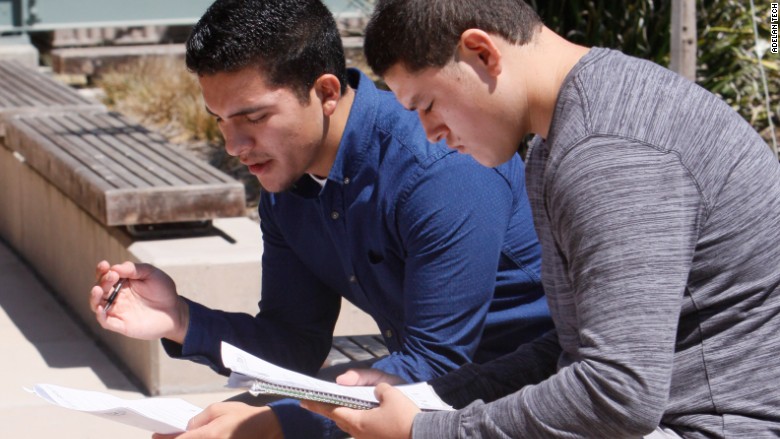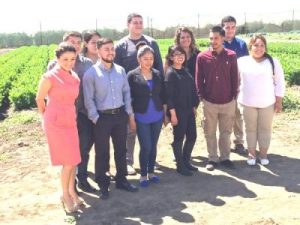
An excellent write-up by Diverse on the AdelanTech Program. Read the full article here.
 Lidia Bautista’s work as a picker at the Monterey Mushroom Co. is hard, exhausting, and comes with a risk of injury. Bautista, a 24-year-old, wanted to attend college, but, as a single mom of a 5-year-old, she went to work full time instead.
Lidia Bautista’s work as a picker at the Monterey Mushroom Co. is hard, exhausting, and comes with a risk of injury. Bautista, a 24-year-old, wanted to attend college, but, as a single mom of a 5-year-old, she went to work full time instead.
But now Bautista has gotten a chance to further her education while she’s working. And she hopes to trade in her agricultural job for one where she uses her mind, rather than her body. She and 11 other farm workers and children of farm workers make up the pilot group of the AdelanTECH Leadership Program. Through lessons in Web development and programming online, they will get a technology degree in one year. They are also learning about interviewing, presenting themselves and job readiness through the nonprofit leadership trainer Coro.
Since starting last summer, Bautista has seen a difference.
“I feel more confident about myself,” she said. “I can talk in front of people and express myself. The first time I had to talk in front of the group, I was so nervous I was shaking.”
Seeking to better represent the demographics of the state, AT&T California backed the program financially and teamed up with the United Farm Workers (UFW) to look for 18- to 24-year-olds interested in learning both technology skills and leadership.
Ken McNeely, president of AT&T California, says that he was excited to work with the legendary union started by Cesar Chavez in the most heavily agricultural region of the state.
“One of the things that struck me as a particular oddity was the proximity of Silicon Valley to the Central Valley and the great disparity we were seeing there,” he said. “There was a real opportunity gap.”
Along with learning technology skills, McNeely thinks it’s crucial that participants learn what he calls 21st century skills, collaboration and critical thinking through Coro.
For that part of their training, the participants get together one Saturday a month at a classroom at Salinas’ Hartnell Community College. On a recent Saturday, Salinas Assemblymember Luis Alejo told them about his experiences growing up as children of farmworkers and going on to get his law degree at the University of California, Davis and then a master’s in education at Harvard University. When Alejo was done, they asked him questions: What does he spend the most time on in his job? What inspired him to get involved in politics? What’s his advice for young people in Salinas who want to make a difference?
Getting to interview people such as Alejo, along with McNeely and UFW President Arturo Rodrigues, has made him much more confident, says 19-year-old Michael Acosta.
Acosta, whose grandparents and parents worked as farmworkers, following the crops to pick apricots and strawberries, wanted a more stable life when he raises his own family some day. He discovered he was good at technology, and he’s studying computer science at Hartnett along with learning about programming and web development from the online Udacity lessons. Acosta thinks the Coro sessions have been extremely useful as well, and he’s gotten feedback on how to present himself—such as not moving so much and speaking loudly enough to be heard—that has made him more comfortable expressing his ideas.
“It teaches you how to become a leader and to use those skills in the workforce to be able to advance,” he said. “You get comfortable with being yourself and telling your story and introducing yourself and getting contact information from people to follow up with them.”
All the participants have improved, says UFW’s Bonita Rivera, who recruited Acosta and the others for AdelanTECH. She says that, along with their desire to learn about technology and give back to their communities, they have something else in common.
“They wanted to be relevant,” she said. “They wanted to be part of the changes in society and figuring out how to use those changes in everyday life.”
The participants commit to the Saturday sessions and doing their Udacity online programs—along with their other work, school and family obligations. And they are responsible for having a computer and wireless access.
For Bautista, who can’t get connected at home, that means driving to her mother’s place after work several nights a week. This can be tiring and her son doesn’t understand why she’s not playing with him. But the payoff will be worth it, Bautista thinks.
“The job I have now, it’s physical—it’s hard, it’s agriculture, so you’re working with your body,” she said. “I’m sure in technology, you can end stressed or tired, but you’re working with your mind.”
That’s what McNeely wants for the AdelanTECH participants—to know there’s that possibility.
“Growing up as an African-American, I certainly could never have envisioned myself being the California leader of a technology company,” he said. “I never thought someone would pay me for my mind, just to think, to give an opinion. So the whole idea behind taking this program to the Central Valley is to give chance a chance. To allow these kids to see other opportunities out there. Because I don’t think there are a lot of people that look like them in technology space, so I want them to see themselves reflected.”